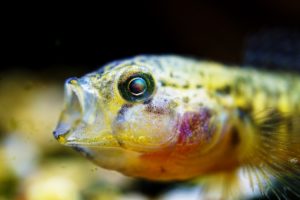The Persistence of Little Fish
 It’s been a couple of years since I wrote about The Little Fish, that sense that the things that devour our kids with disabilities aren’t always the big creatures. At the time, I put it this way:
It’s been a couple of years since I wrote about The Little Fish, that sense that the things that devour our kids with disabilities aren’t always the big creatures. At the time, I put it this way:
As parents of kids with disabilities, we step up to the big fights, and while they can be exhausting and definitely take their toll on us, I think in some way we prefer them to the alternative. The struggles that truly tear us down and leave us dispirited are the little ones, the tiny indignities that defy our long-developed skills for the Big Fight. They can’t be confronted with a sword, and we’re not necessarily adequately armed with flyswatters. We fear our children being eaten by alligators, only to discover that they are more likely to be devoured by little fish, one tiny bite at a time.
And when we call attention to it, we appear unreasonable, because it’s just a little fish, right? That one little nibble is hardly worth all the arm waving.
I was writing about the small, individual indignities that our kids endure. That certainly hasn’t changed. I suspect those encounters are a universal experience that will endure as long as there are people in the world who can say stupid things and commit acts of carelessness and cruelty. I certainly don’t see indications that we as a people have improved where taking care of our vulnerable populations are concerned.
When I wrote about the little fish that quietly eat our kids up while we’re busy watching for sharks, I had no idea how many little fish were going to spawn in the coming years, or how sharp their teeth would become.
Some of the fish aren’t all that small. Betsy DeVos was certainly something of a leviathan, for example, and her lack of even basic knowledge of special education law in this country was deeply troubling. We worried that a tone was being set by the incoming administration, one with new priorities that did not include our kids. We’d seen a presidential campaign where denigration of people with disabilities became just another cheap, throwaway line to make campaign rally crowds whoop and laugh. As a community of parents and educators and people with disabilities, we waited to see what would happen once rhetoric gave way to policy.
And then it started. The little fish began to show themselves.
House Bill 610 was introduced by Representative Steve King in January, almost immediately after the inauguration. The bill’s description was fairly brief and to the point. “To distribute Federal funds for elementary and secondary education in the form of vouchers for eligible students and to repeal a certain rule relating to nutrition standards in schools.”
I think it’s fair to describe this as the beginning of a process of defunding public education in this country, which will be bad for everyone but devastating for students with disabilities. The bill doesn’t even mention protection of those students; not so much as a mention of IDEA or FAPE.
What the law WOULD do, besides abolishing the Nutritional Act of 2012 (No Hungry Kids Act) because apparently hungry kids are eating up all our money, is eliminate the 50-year-old Elementary and Secondary Education Act (ESEA), which was reauthorized by President Obama’s Every Student Succeeds Act (ESSA) in 2015.
ESSA provides a lot for a very diverse collection of students. For kids with disabilities, it ensures access to accommodations and general education curriculum, it requires local schools to provide evidence-based interventions on campuses with underperforming subgroups, and it requires states to address issues such as bullying and harassment, overuse of disciplinary practices and the use of adverse behavioral interventions like seclusion or restraints.
These are real issues for students with disabilities. These aren’t hypothetical. And like our metaphorical little fish, they represent systematic bites out of the support system we rely on.
I saw a smaller but more devilish fish swim by last week. The Arizona Senate passed a bill, SB 1317, which would attempt to address overburdened and cash-strapped schools by pulling special education teachers out of their programs and into general education classrooms. The bill would qualify any teacher with a credential to instruct special education students with intellectual or physical disabilities.
There are certainly a number of ways to interpret this bill, but there’s no denying its core philosophy: Instead of paying for expensive special education services and personell, why not just let kids with disabilities sit with everyone else and do the best they can? Isn’t that what inclusion is all about?
It isn’t. And it’s an insidious little fish, because it sounds reasonable enough. IEPs would still be built by special educators and their support teams, after all. Federal law requires that. (For now.) Mostly, it plays to a persistent whispered narrative that’s familiar to those of us whose kids require extra support. “We should be putting our resources into our kids who are going to amount to something. Not, you know, YOURS…”
Little fishes. And there’s blood in the water now. We should be ready for more of them.
Note: To support the site we make money on some products, product categories and services that we talk about on this website through affiliate relationships with the merchants in question. We get a small commission on sales of those products.That in no way affects our opinions of those products and services.

